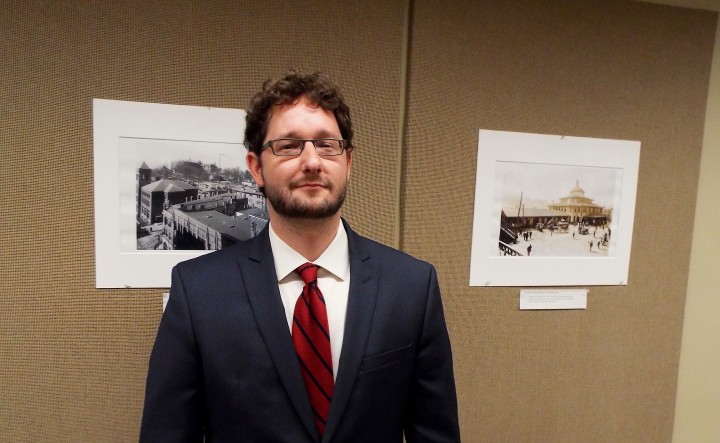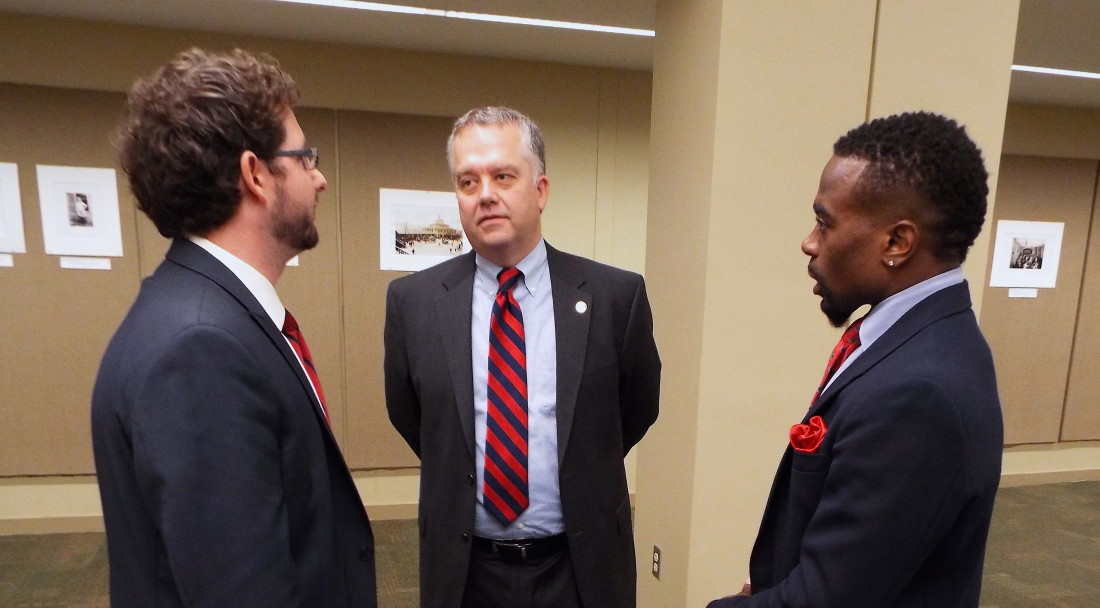People in search of renewed opportunity flowed into the auditorium at Pack Memorial Library in Asheville on Wednesday, July 8, when lawyers and interns from Pisgah Legal Services and Legal Aid of North Carolina helped clients seek expungements of criminal records. Over the course of the day, 45 people had an opportunity to meet with legal specialists at Buncombe County’s first district attorney-sponsored expunction clinic.
District Attorney Todd Williams says the idea for the event was germinated at a Buncombe County Re-entry Council meeting at which Daniel Bowes of the N.C. Justice Center had spoken. “There was a broad conversation about what the obstacles to achieving expunction or expungement for most folks are,” said Williams, “so I just sort of raised my hand and said: ‘We do criminal record checks in the courthouse every day. Is there a way to set up computers downstairs and have folks come in?’” Bowes then told Williams that Legal Aid of North Carolina, with which he is also involved, had held expunction clinics last year in partnership with DA Ben David in New Hanover County. After that, Williams and Bowes worked together with representatives from Pisgah Legal Services to organize Wednesday’s clinic.
Williams helped promote the clinic and organized accommodations for the volunteers, who stayed at Jubilee Community Center on Wall Street. According to Bowes, it is not common for DAs to co-sponsor expunction, and besides Williams and David, he knows of no instances, of this kind of support. In his view it is forward-thinking of Williams “to understand that justice needs more than punishment, [and that] it also includes providing second chances to certain individuals.”
From a legal standpoint, an expunction (or expungement) destroys a criminal record . And with very few exceptions, it is as if the record never existed. North Carolina law, according to Williams, “allows folks to expunge: dismissals, not-guilties and prior convictions, in certain circumstances where folks have moved on in life and paid their debt. And,” he continues, “broadening folks’ access to expungements, I think, is in the interest of justice.”
The pursuit of these second chances is a “relatively new realm of law,” Bowes asserts. He says that “traditionally, [people interested in justice] have focused on the direct consequences [of a criminal record], which are incarceration and probation … but what we have seen in the digital age is that the collateral consequences of a criminal record, [such as] isolation from employment opportunities, good affordable housing and from the resources that are essential to productive citizenship, are often more devastating and impactful on the individual’s life than the direct consequences.”
These records often exist for the protection of the community. And Williams acknowledges that “in the realm of hypotheticals,

somebody could always come back and say, ‘If only we had known,’ but the legislature has moved very cautiously, and expungement is only available for nonviolent offenders.”
Bowes also offers a compelling argument for the process. “Expunctions and certificates of relief restore employment and affordable housing opportunities for individuals who are ready and eager to contribute, and by doing so, that makes communities stronger and safer.”
Williams explains that providing the community with free access to a clinic like this is helpful because of the obstacles to expunction. The process includes having to “have access to a state criminal database and not just you know what’s down the street on College Street, in the courthouse, but you also have to check all 100 counties, so you have to have access to the computer infrastructure that comes out of Raleigh. Affidavits have to be signed, forms have to be prepared, you need a lawyer to do that, they need to be filed, a judge needs to sign off on them. Typically, there are fees associated with all that.” In his view, seeking expunction can be prohibitively expensive in terms of time and money. “When your priority is putting food on the table and [you are] living day to day, your last thought is to pay an attorney $250 to file paperwork.”
There has been a great deal of interest in the program, according to Williams and Bowes. Screenings of potential clients were performed through Pisgah Legal in May and June, and between 50 and 60 people were accepted. After being accepted as clients, according to Bowes, the clinic attendees are fully represented by the staff of Legal Aid of North Carolina without charge. Most of the time at the clinic was spent conducting interviews with the clients to look for potential roadblocks in the process and establish need. In the interviews, the volunteers attempt to get a feel for whether this kind of aid is going to break down the barriers the client is facing.
The next phase of the process for the group served at the clinic is waiting for their cases to be processed. If the applicants are granted a certificate of relief, that will only take about two months, according to Bowes. A certificate of relief is an official document that keeps one’s record from being held against one for certain considerations. But if clients receive an expunction, it usually takes about six months to process, and it can take up to another six month for the records to be completely “scrubbed” from all appropriate databases. Still for many of the clients, this could seem swift because to become eligible for expunction, a convicted person has to wait 15 years.
Looking to the future, Williams feels that Buncombe County is likely to see more expunction clinics. Bowes was also encouraged by the response. He reckons that there were about 75 folks at an information session about eligibility for expunction held after the clinic. And he noted between 30 and 35 lawyers attended a continuing legal education workshop he led about collateral consequences and expunction, held Tuesday. He is excited because the mission of the clinic in his mind is to “not only provide relief to low-income individuals, but also get the local community talking about these issues.”




Bravo, Todd Williams for taking this action. As is stated in the article, justice involves more than punishment.